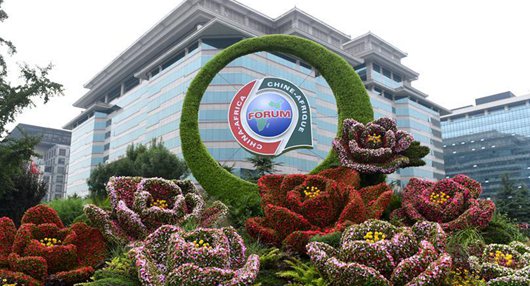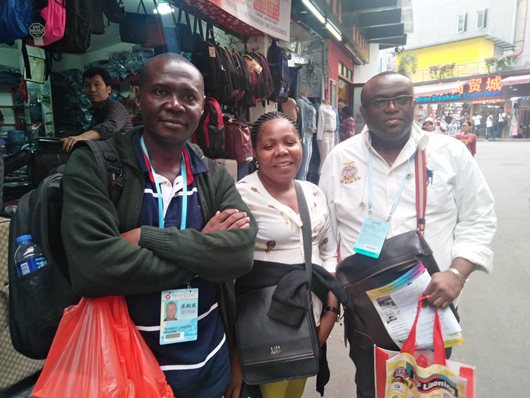


Photo taken on Aug. 28, 2018 shows a parterre to greet the 2018 Beijing summit of the Forum on China-Africa Cooperation (FOCAC), which is scheduled for Sept. 3-4 in Beijing, capital of China. (Xinhua/Luo Xiaoguang)
Still reveling in the successes of the last Forum on China-Africa Cooperation (FOCAC) summit in Johannesburg, South Africa in December 2015, Africa has another important date with its largest trade partner in Beijing, China this September.
Liberation Struggle Support
China and Africa have been friends for a long time, but the most recent memories of such relations date back about 60 years, to the heydays of the continent’s struggle for independence. This struggle lasted well into the 1970s (mostly with ex-Portuguese colonies) and even the early 1990s for South Africa and Namibia (or South West Africa as the territory was then known.)
While many Western powers sought to keep Africa in perpetual subjugation and under imperialist control, China was on the side of African nationalists. Such support helped Africans assert control of their sovereignty and destinies.
In return, Africa’s support for the recognition of the People’s Republic of China (PRC), in replacement of the defeated Kuomintang-led Republic of China (ROC), during the United Nations General Assembly vote of October 25, 1971, was crucial. Ever since, the bonds of friendship, evident in political exchanges and trade between Africa and China, have continued to grow. The Forum on China-Africa Cooperation, FOCAC in 2000 – first at the ministerial level – has since added greater impetus to ties between the two sides.

Peope-to-people exchanges between Africans and Chinese have continued to be on the increase over the years (Photo by Kimeng Hilton)
Impetus of FOCAC 2015
The last FOCAC summit in Johannesburg, South Africa in December 2015 marked a turning point in relations. During the summit, China pledged $60 billion in funding support to carry out 10 major plans to boost its cooperation with Africa.
Almost three years after the FOCAC Johannesburg summit, China has already met its target. “We have fulfilled the 60 billion US dollars financing pledge to Africa over three years, though some projects under the 10 cooperation plans will continue into the next three years,” Jiang Wei, Director General of Western Asian and African Affairs in China’s Ministry of Commerce, told fellows of the China Africa Press Centre in Beijing last June.
The 10 cooperation plans agreed at the Johannesburg summit have been effectively implemented, giving strong impetus to enhancing cooperation for a prosperous future. The $60 billion comprised of grants, commercial loans and export credits, the China-Africa Development Fund and special loans for the development of human resources, infrastructure and manufacturing.
Since the FOCAC was set up in 2000 to serve as a high-level economic diplomacy platform between China and Africa, trade exchanges have been dramatic, says a recent report by China Daily. “For every $100 of products Africa exported at the start of FOCAC in 2000, around $3 worth were sold to China. Fifteen years after the establishment of FOCAC, the figure rose to $24 in 2015,” Jiang Wei told the press in Beijing recently.
Furthermore, the volume of China-Africa trade was 1 billion US dollars in 1980, rising to 10 billion US dollars at the beginning of FOCAC in 2000. By end of 2014, China-Africa trade had surpassed 200 billion US dollars. Moreover, China’s total investment stock in Africa is currently about 120 billion US dollars, with over 3,100 Africa-based enterprises.

China also exports heavy duty mining trucks to Africa (Photo by Kimeng Hilton)
Fostering Win-win Cooperation
At this year’s Africa Day celebration in Beijing, marking 55 years of the foundation of the African Union – formerly known as the Organisation of African Unity, OAU, diplomats spoke, among others, on “Sustainable Development in Africa and China-Africa Relations: Opportunities and Challenges.” They were unanimous that China and Africa should strengthen win-win cooperation and foster industrialization. Speakers emphasized the importance of peace for Africa’s development.
“Actors in China-Africa cooperation should bear in mind that each African country has its own peculiar culture. We will use the FOCAC 2018 Beijing Summit to discuss how we can enhance the development of our continent. Agenda 2063 should generate a peaceful and prosperous society…an Africa of good governance, common heritage, values and identity, a strong, resilient and one Africa,” the Ambassador of Cape Verde to China underscored.
The Cape Verde Ambassador called for a conflict-free and peaceful continent and encouraged African governments to embrace the Belt and Road Initiative to connect Asia and Europe with Africa. A former Chinese Ambassador to Congo appreciated African hospitality and said there are many cooperation opportunities. He emphasized the role of industrialization in building a prosperous Africa, noting that the China-Africa industrialization plan can yield a great deal.
The Media’s Place
The Fourth Forum on China-Africa Media Cooperation ended in Beijing on June 26, 2018. It sought to carry forward the traditional friendship between Africa and China, promote mutual learning and deepen media cooperation. Both parties resolved to encourage the dissemination of the outcomes of the FOCAC Johannesburg Summit, facilitate the 2018 Beijing Summit and further promote win-win cooperation and common media development.
Gregoire Ndjaka, the Chief Executive Officer of the African Broadcasting Union, called for more to be done for Africa in the areas of signal quality, audiovisual improvements, training and retraining of broadcasters to improve the quality of reporting.
Staying in the media domain, the number of participants for the China Africa Press Centre (CAPC) has continuously increased since its inception in 2014. The number of journalists for the fourth CAPC batch (2017) stood at 27 – all from different African nations.
Today, hardly a month goes by without African media and other professionals arriving in Beijing for training and experience-sharing with their Chinese counterparts. Each year, China’s media giant, the Star Times Group, gathers scores of senior African broadcast professionals and government officials in Beijing for a two-day seminar on digital switch-over and experience-sharing.
Brighter Prospects for Cooperation
What better way is there to connect Africa and China than the opportunities offered by the Belt and Road? The Chinese-driven initiative is not only boosting economic development on the continent, but also facilitating connectivity among African and Chinese people. The opportunities presented by the Belt and Road Initiative are enormous.
Understandably, the future holds greater prospects for China-Africa cooperation in a growing number of domains. As the world becomes a global village, there is no reason why Africa and China should not become even greater friends in the years to come. The growing number of Africans studying in China and the rising portfolio of Chinese investments on the continent only point in one obvious direction.
China and Africa are bound by destiny to be great friends for much longer than anyone might guess today. The upcoming Forum on China-Africa Cooperation (FOCAC) 2018 Beijing Summit in Beijing, capital of China, is another memorable date for both sides, from which more fruitful cooperation deals are expected.
Kimeng Hilton Ndukong, a 2017 Fellow of the China-Africa Press Centre, is Sub-Editor for African News with the Foreign Desk of Cameroon Tribune bilingual daily newspaper in Cameroon.
 Fire brigade in Shanghai holds group wedding
Fire brigade in Shanghai holds group wedding Tourists enjoy ice sculptures in Datan Town, north China
Tourists enjoy ice sculptures in Datan Town, north China Sunset scenery of Dayan Pagoda in Xi'an
Sunset scenery of Dayan Pagoda in Xi'an Tourists have fun at scenic spot in Nanlong Town, NW China
Tourists have fun at scenic spot in Nanlong Town, NW China Harbin attracts tourists by making best use of ice in winter
Harbin attracts tourists by making best use of ice in winter In pics: FIS Alpine Ski Women's World Cup Slalom
In pics: FIS Alpine Ski Women's World Cup Slalom Black-necked cranes rest at reservoir in Lhunzhub County, Lhasa
Black-necked cranes rest at reservoir in Lhunzhub County, Lhasa China's FAST telescope will be available to foreign scientists in April
China's FAST telescope will be available to foreign scientists in April "She power" plays indispensable role in poverty alleviation
"She power" plays indispensable role in poverty alleviation Top 10 world news events of People's Daily in 2020
Top 10 world news events of People's Daily in 2020 Top 10 China news events of People's Daily in 2020
Top 10 China news events of People's Daily in 2020 Top 10 media buzzwords of 2020
Top 10 media buzzwords of 2020 Year-ender:10 major tourism stories of 2020
Year-ender:10 major tourism stories of 2020 No interference in Venezuelan issues
No interference in Venezuelan issues
 Biz prepares for trade spat
Biz prepares for trade spat
 Broadcasting Continent
Broadcasting Continent Australia wins Chinese CEOs as US loses
Australia wins Chinese CEOs as US loses